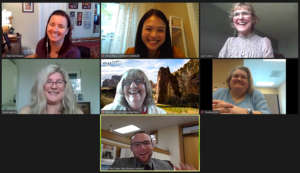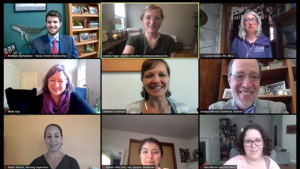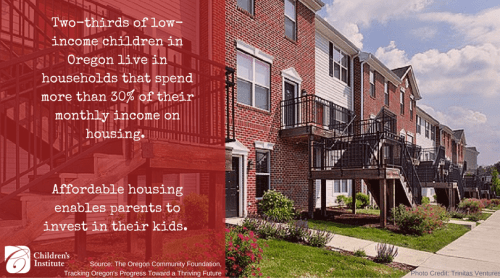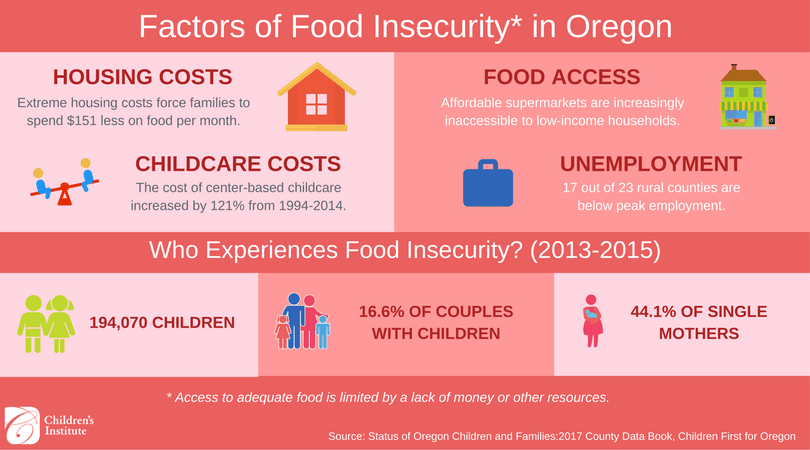Early Child Advocates, Lawmakers, Gather Virtually for Advocacy Days
Last week, Early Childhood Coalition (ECC) partners and advocates from across Oregon gathered virtually for Early Childhood Advocacy days.
To prepare for three days of meetings with legislators, the ECC hosted a kick-off event on May 4th, which included nearly 50 participants. Three guest legislators also joined us — Representative Karin Power, Representative Jack Zika, and Representative Tawna Sanchez.
Representative Sanchez from North and Northeast Portland explained to advocates why it’s important to share their stories with legislators: “What matters to the future generations is right here and right now,” she said. “What it takes is all of us with a voice to stand up and say something, to try to make change and shift around here. Our future generations are depending on us to make something happen.”
 By the end of the kick-off, participants knew how to write an advocacy letter, learned tips for talking to legislators, and practiced giving testimony.
By the end of the kick-off, participants knew how to write an advocacy letter, learned tips for talking to legislators, and practiced giving testimony.
Over the next few days, nearly 50 attendees including child care providers, educators and parents from across the state met with more than 20 lawmakers.
During meetings, advocates shared their own experiences and urged legislators to commit to continued improvement in early care, education, and supports for all of Oregon’s young children and families, and to center the voices of those most impacted by legislative actions in their decision-making.
Staff from Healthy Families Oregon, a voluntary home visiting program that serves families expecting or parenting newborns, described their first-hand experiences working closely with families, and expressed a critical need for home visiting services. They also addressed the ways that low-wages create a barrier to hiring and retaining qualified home visitors. One of the ECC’s 2021 legislative priorities is to expand early childhood investments, which includes expanding funding for Healthy Families Oregon home visiting and providing wage parity for relief nurseries, to reduce turnover and stress among early childhood providers.
 Not to mention, disparities in early childhood have only been intensified by the ongoing pandemic which advocates say will have lasting effects. Advocates reminded lawmakers that children born during the COVID-19 pandemic will be entering kindergarten as the state is climbing out of a recession and the decisions made during this session will influence the trajectory of their lives and Oregon’s future.
Not to mention, disparities in early childhood have only been intensified by the ongoing pandemic which advocates say will have lasting effects. Advocates reminded lawmakers that children born during the COVID-19 pandemic will be entering kindergarten as the state is climbing out of a recession and the decisions made during this session will influence the trajectory of their lives and Oregon’s future.
“We have seen first-hand the impacts of the pandemic on families,” said Robin Nelson with Multnomah County’s Nurse-Family Partnership. “We know that the setbacks are huge and will continue for years.”
Overall, the response from legislators was hopeful. Representative Jason Kropf acknowledged the challenges that many organizations face when they are asked to fill service gaps with limited funding and resources, and voiced his support for front-end investments that will help children, families and providers. As to the prospects for the state budget and investments in early childhood, Senator Dembrow of Portland expressed optimism. “There is a lot of support in the legislature right now for child care programs and early learning,” he said.
We want to thank our ECC partners and advocates who shared their stories with lawmakers, and were early childhood champions during Advocacy Days.




